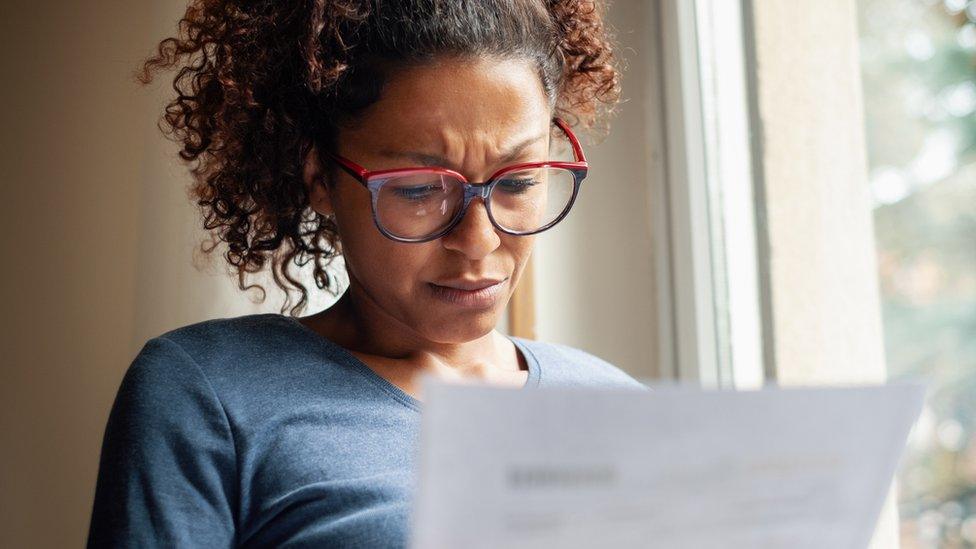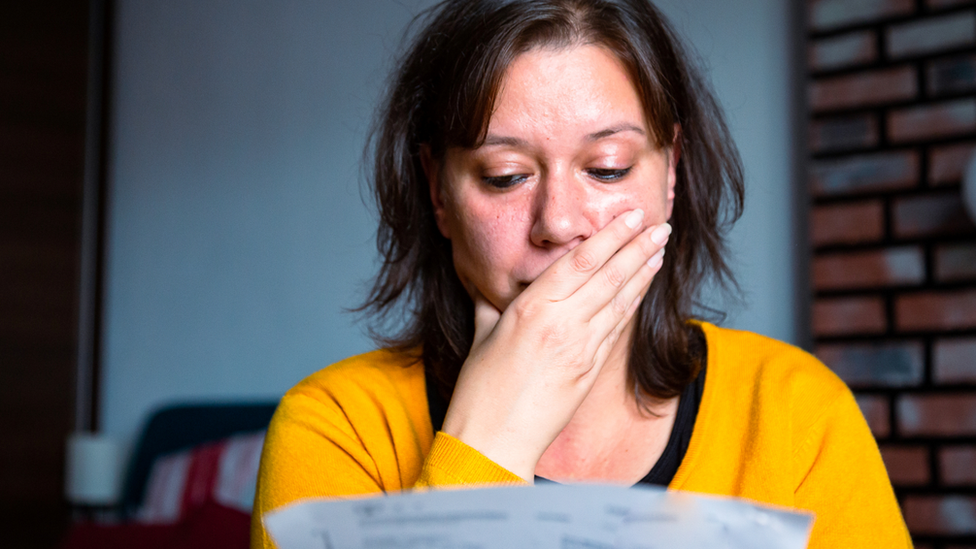Energy bills to rise and fall quicker to avoid price shocks
- Published
- comments

Household energy bills will change every three months under new plans aimed at avoiding price shocks.
Currently, the price cap - the maximum amount suppliers can charge their customers in England, Scotland and Wales - changes every six months.
Energy regulator Ofgem says the change means price rises and falls will be passed on to customers more quickly.
Energy bills soared in April and are expected to rise sharply again in October, when the cap goes up.
Ofgem said customers "face a very challenging winter ahead" and acknowledged the situation was "deeply worrying" for many people.
In May, Ofgem said the typical household should expect to see an £800 increase to £2,800 a year, but it now says prices are looking higher than when it made that estimate.
Industry analysts Cornwall Insight said the typical household was likely to pay £3,358 a year from October, then £3,615 a year from January - up from its previous estimate.
In October 2021 the average bill was £1,400 a year.
The price cap does not apply in Northern Ireland, but households there have also seen bills rise.
Ofgem said updating the price cap more regularly would also help energy suppliers better predict how much energy they need to purchase for their customers. This in turn could help reduce the risk of more suppliers failing.
Since early last year, more than 30 UK energy companies have failed after firms found themselves unable to pass on the full cost of soaring wholesale gas prices to their customers because of the price cap.
"Today's change will go some way to provide the stability needed in the energy market, reducing the risk of further large-scale supplier failures which cause huge disruption and push up costs for consumers. It is not in anyone's interests for more suppliers to fail and exit the market," said Ofgem.
Energy minister Greg Hands said: "It makes sense for the cap to be adjusted at a reasonable frequency.
"If energy prices were to start to fall people would see those benefits more quickly."
But Simon Francis, of the campaign group End Fuel Poverty Coalition, said the decision was "simply inhumane".
"Ultimately, this decision will force more people into fuel poverty in the middle of winter, causing additional stress on the NHS and it may ultimately lead to increased levels of excess winter deaths this year," he said.
"Only a full programme of emergency financial support, a rapid expansion of energy efficiency programmes and a commitment to bringing more cheap renewable energy on stream will help people stay warm this winter and into the future."

How have you been affected by rising energy prices? Share your experiences by emailing haveyoursay@bbc.co.uk, external.
Please include a contact number if you are willing to speak to a BBC journalist. You can also get in touch via WhatsApp: +44 7756 165803, external and Twitter: @BBC_HaveYourSay, external

The energy price cap introduced in 2018 is based on the price energy suppliers pay producers for their electricity and gas. It sets a maximum suppliers can charge per unit of energy and caps the level of profits an energy supplier can make.
The cap has already been increased - demand for gas rose after Covid restrictions eased then prices soared again following the war in Ukraine.
Russia is one of the world's biggest gas producers and has already cut supplies to some European countries. Meanwhile, Western nations have also moved to phase out Russian imports in response to the invasion. This has increased demand for other sources of energy, increasing global prices.
Ofgem warned this mean the price cap, which will be published at the end of August, would rise again, but by changing it every three months any reductions in wholesale prices would be passed on more quickly to customers.
It said paying a rate that is up to six months out of date in the current changeable market was "no longer sustainable and could mean either consumers paying too much for months if wholesale prices have fallen or suppliers left unable to supply gas with the money they are allowed to charge if prices have risen".


"Will the changes save me money?"

Ofgem says it wants to cut the lag-time between wholesale price changes and the amount customers are charged which would limit the risk of suppliers going bust and pass on potential savings to consumers more quickly. So when wholesale prices are going down that will mean you're not having to wait months before that money is taken off your bills - so far so good.
But the flip side is also true - and that's the position we're in right now. When wholesale prices are going up that will get added onto customer's bills more quickly. That means sharper, more frequent shocks for the next while as analysts aren't expecting global energy prices to drop any time soon.
More frequent changes will make it more difficult to budget as prices will change every three months, and there's less time for suppliers to inform customers of changes, so increases really will come as a shock to some.
So don't bank on this change saving you any money right now. As we head into the most difficult winter for a generation in terms of living costs, more than three quarters of households in Britain now face an energy price rise in January too, when people can least afford it.
- Published2 August 2022

- Published16 May 2022

- Published1 April 2022

